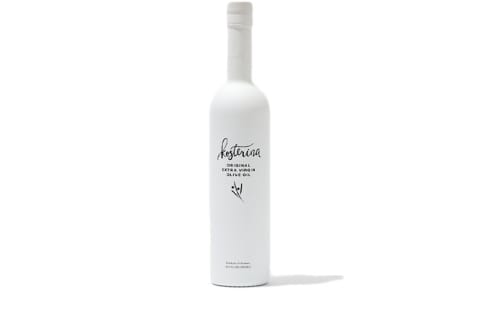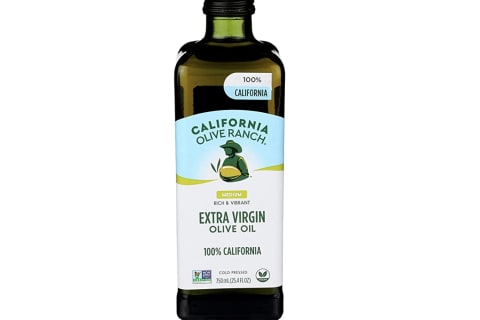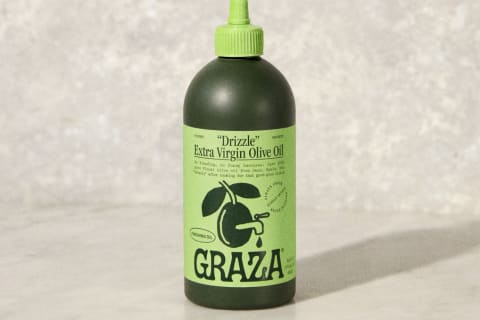Advertisement
Olive Oil vs. Vegetable Oil: How They Compare & When To Use Each


Cooking oils are a hot topic. Almost everyone uses them, but the advice on which oils are healthy and which ones are not always seems to be changing (remember the coconut oil controversy?).
In this article, we'll discuss vegetable oil and olive oil, and the research on which one of these popular oils actually deserves a spot in your pantry.
What is olive oil?
Olive oil is made by extracting oil from whole olives, the fruit of the olive tree. It's made either through mechanical or chemical extraction, and the type of extraction plays a role in the taste and nutritional value of the finished product.
Extra-virgin olive oil is a manual process that involves mashing up fresh olives and spinning or kneading the mixture to separate out the oil. Typically, there's no heat or chemicals involved. Extra-virgin olive oil is considered cold-pressed if its temperature during extraction stays below 122 degrees Fahrenheit, according to holistic dietitian Michelle Shapiro, R.D.
In addition to extra-virgin olive oil, you can also find regular, "pure," or "light" varieties of olive oil. These variations are usually produced with chemicals or heat. This process is more cost-effective for the manufacturer, but it can result in an inferior oil. Typically, this type of olive oil is a mixture of unrefined virgin olive oil and refined olive oil that is refined with heat and chemicals, Nielsen told mbg.
Health benefits:
Olive oil is linked to several health benefits. "Oleic acid1, the main fatty acid in olive oil, is a monounsaturated fat (MUFA) that can reduce inflammation2, lower LDL (harmful) cholesterol levels, increase HDL (healthy) cholesterol levels, decrease blood pressure, reduce cardiovascular disease risk, and support neurological function," says Shapiro.
Olive oil also contains other bioactive compounds (it's estimated to have more than 303) that offer additional health benefits. It's rich in phenols and phytosterois, which have anti-inflammatory, antimicrobial, and antioxidant properties, explains Shapiro. These bioactive compounds can neutralize free radicals in the body, protecting our DNA and other cells from oxidative damage.
"Ultimately, the antioxidant capacity of these bioactive compounds can be helpful in reducing risk of cardiovascular and cancer diseases, diabetes, and inflammation, which is the precursor for many diseases," Shapiro says.
Research shows that olive oil can also have positive effects on mental health4 and stress levels, and it can moisturize your skin and hair.
It is important to note that extra-virgin olive oil is the healthiest olive oil since it contains the highest concentration of bioactive compounds compared to other oils. This is because it undergoes the least processing. Meanwhile, refined vegetable oil loses most of its beneficial qualities and nutrients during processing.
The nutritional breakdown of a tablespoon of olive oil5 looks like this:
- Calories: 119
- Total fat: 13.5 grams
- Saturated fat: 1.86 grams
- Polyunsaturated fat: 1.42 grams
- Monounsaturated fat: 9.86 grams
- Vitamin E: 1.94 milligrams
Smoke point:
According to the North American Olive Oil Association, the smoke point of olive oil can vary widely depending on its free fatty acid profile. Extra-virgin olive oils typically fall between 350 and 410 degrees Fahrenheit, whereas refined oils can range from 390 to 470 degrees Fahrenheit.
Because of this, extra-virgin olive oil is usually reserved for medium-heat cooking, while refined oils can withstand higher cooking temperatures.
Taste:
Olive oil has a very distinct taste. Some describe it as herby, fruity, or buttery—but the flavor profile can largely depend on which type of olive oil you're using. Light olive oils are more neutral than extra-virgin varieties. Depending on how much processing they've gone through, they still might have some olive-y flavor.
Price:
There are many factors, like production cost and methods, time of harvest, type of olives, and age of the oil, that can affect the cost of olive oil. In general, "A high-quality olive oil may be a bit pricier than other oil varieties, so this may be an extra consideration when grocery shopping," says Shapiro.
What is vegetable oil?
Vegetable oil is a bit of a misnomer since most vegetable oils actually come from seeds, fruits, or grains, and not vegetables, according to Shapiro.
Vegetable oil is more refined than olive oil, and because of this, there are several more steps involved in the process. "First, the fruit or seeds must be planted, harvested, and cleaned. Next, the oil is extracted by mechanical or chemical extraction. The majority of vegetable oils are made by chemical or 'solvent' extraction, which typically involves heating the seeds and mixing them with a solvent called hexane. The oil then undergoes the refining, bleaching, and deodorizing (RBD) processes to create a consistent, shelf-stable, neutral-flavor product," says Shapiro.
Health benefits:
When it comes to vegetable oil, there are some upsides. Vegetable oils are a good source of important fatty acids6, like both types of unsaturated fats (PUFA and MUFA). And some studies7 show that replacing butter or margarine with unsaturated fats may reduce the risk of heart disease.
However, the ratio of omega-6 to omega-3 fatty acids in some vegetable oils (sunflower, corn, cottonseed, soybean) is not ideal. "While the optimal ratio of omega-6 to omega-3 is 2:1, the average American diet contains a ratio of 20:1. A diet that is high in omega-6 fatty acids and low in omega-3 fatty acids can promote inflammation, which is associated with many chronic diseases such as heart disease, cancer, and arthritis," says Shapiro.
For reference, Americans are consuming around 3 tablespoons8 of vegetable oil per day. Instead, Shapiro recommends aiming to consume more anti-inflammatory omega-3 fats and MUFAs (which are found in higher concentrations in olive oil).
Due to the extensive processing of vegetable oil, it retains fewer nutrients and less flavor than olive oil.
The nutritional breakdown of a tablespoon of vegetable oil9 looks like this:
- Calories: 120
- Total fat: 13.6 grams
- Saturated fat: 2.08 grams
- Polyunsaturated fat: 6.84 grams
- Monounsaturated fat: 3.09 grams
- Vitamin E: 1.11 milligrams
Smoke point:
Vegetable oil has a 400-degree Fahrenheit smoke point, which is higher than some extra-virgin olive oils. For this reason, it's often used in high-heat cooking and for deep frying.
Taste:
Because it's so highly processed, vegetable oil has a very neutral taste. This lack of flavor makes it a go-to choice in processed and packaged foods, and for baking.
Price:
Vegetable oil is less expensive than olive oil and generally one of the cheapest options out there. If you can find cold-pressed and/or unrefined versions (which Shapiro recommends), you'll likely pay a higher price for the better quality.
Is one better for you?
In this head-to-head comparison, olive oil wins.
Olive oil is richer in monounsaturated fats, which can help reduce LDL cholesterol and increase HDL, explains integrative dietitian Jessica Cording, R.D. "Olive oil [also] has a lot of antioxidants and other health-promoting compounds that have lots of proven health benefits, like reduced inflammation," she says.
Vegetable oil can work in a pinch, but you really want to be mindful to not overconsume it. If you're eating a lot of packaged foods or restaurant meals, using olive oil at home can help reduce your overall vegetable oil intake.
When it comes to which type of olive is best? Extra-virgin takes it here. "Not only is it the ideal choice at lower cooking temperatures, research shows that it is also more stable at higher temperatures than other common cooking oils," says Shapiro, adding that "the combination of monounsaturated and omega-3 fats, retention of antioxidant and anti-inflammatory compounds, and oxidative stability makes extra-virgin olive oil the top pick.
Summary
When should you use each?
While olive oil is the ultimate winner here, there are certain times when it may be more appropriate to use vegetable oil. Here's a breakdown of when you should use each type:
Baking: Either, but vegetable oil is better for baked goods
Both types of oil can be used for baking. However, if you're making desserts, vegetable oil is the better option because of its neutral flavor.
If you substitute olive oil for vegetable oil, the finished product will look OK, but it will have an olive-y taste. This can work for some desserts—olive oil cake being one of them—but it probably won't lend well to brownies and chocolate chip cookies.
That being said, Shapiro recommends avocado oil as a healthier neutral-flavored alternative to vegetable oil.
Frying: Vegetable oil for deep frying; olive oil for pan frying
While Cording says we shouldn't be deep frying very often, vegetable oil is the better choice if you do. Because vegetable oil has a higher smoke point, it can withstand the elevated temperatures needed for successful deep frying.
But Shapiro points out that olive oil can be a great option for pan frying, even with its medium smoke point. "It's actually the most stable oil when heated and has a higher level of monounsaturated fats and antioxidant compounds that protect it from heat damage," she says.
Sauteing: Olive oil
Pan-frying and sauteing are similar, but pan-frying requires more cooking oil. When it comes to smoke point, vegetable oil and olive oil can both work for this purpose. But if you're choosing one or the other for health reasons, go with olive oil. Not only is olive oil the healthier choice, but it also adds a nice flavor, according to Shapiro.
Dressing and finishing: Olive oil
"For drizzling/finishing dishes, it is best to use olive oil given its variety of flavors and aromas," says Shapiro. "Extra-virgin olive oil specifically retains most of the natural flavor and aroma and provides a delicious finish to any dish."
How to choose the best product
Just like there are many cooking oils to choose from, there are large discrepancies in oil quality. Not all olive oil is made the same way, and the processing can affect the finished product—both in taste and nutritional value.
So, how do you choose? First, look for extra-virgin olive oil, which undergoes fewer additional processing steps such as bleaching and deodorizing. Shapiro rates the three main grades of olive oil from highest to lowest as extra-virgin olive oil, virgin olive oil, and refined olive oil.
The highest quality olive oils are cold-pressed and come in a dark glass container to protect them from light. Ideally, the oil's olive type, harvest date, and harvest location are also listed on the bottle.
mbg's picks for high-quality olive oils
FAQ
Is frying with olive oil healthier than vegetable oil?
When it comes to health, deep frying isn't an excellent choice no matter which oil you're using. However, olive oil can break down at the higher temperatures required for deep frying, so vegetable oil is the better choice here.
Why use olive oil instead of vegetable oil?
Olive oil is more nutrient-dense than vegetable oil and has a more desirable fatty acid profile. It's rich in monounsaturated fats and antioxidant compounds that have been shown to help reduce heart disease risk, which is why it's a foundational ingredient in the Mediterranean diet.
What happens if you substitute olive oil for vegetable oil?
In most cases, a change in flavor profile is the only significant thing that happens if you substitute olive oil for vegetable oil. The exception is really high heat cooking, like frying. If you use olive oil, which has a lower smoke point, you can degrade the oil, creating a byproduct called acrolein. Aside from irritating your eyes, nose, and throat in the short term, regular exposure to acrolein is associated with negative health issues.
The takeaway
In the battle of olive oil vs. vegetable oil, olive oil comes out on top. Vegetable oil is cheaper and has a neutral flavor, but ultimately it can be more detrimental to your health—especially when overconsumed. On the other hand, olive oil has many science-backed benefits that make it a worthwhile addition to your diet. If you're looking for a healthier, neutral-tasting alternative, nutrition experts recommend avocado oil over vegetable oil.
9 Sources
- https://pubmed.ncbi.nlm.nih.gov/23278117/
- https://pubmed.ncbi.nlm.nih.gov/23165533/
- https://pubmed.ncbi.nlm.nih.gov/31752333/
- https://pubmed.ncbi.nlm.nih.gov/23670794/
- https://fdc.nal.usda.gov/fdc-app.html#/food-details/171413/nutrients
- https://www.ncbi.nlm.nih.gov/pmc/articles/PMC4490476/
- https://pubmed.ncbi.nlm.nih.gov/33853582/
- https://www.ncbi.nlm.nih.gov/pmc/articles/PMC6179509/
- https://fdc.nal.usda.gov/fdc-app.html#/food-details/172370/nutrients


